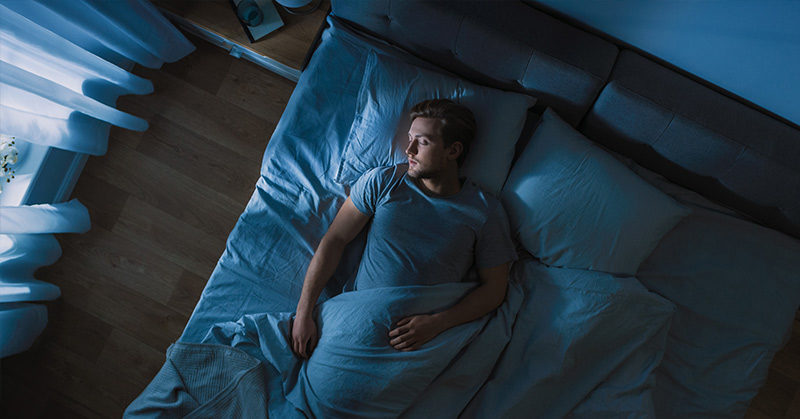Have you ever gone to sleep at night and dreamt that you were falling? Then suddenly, your body jerks, and you are startled awake. An experience like this can be somewhat unsettling, but if it’s happened to you, you’re not alone. This strange occurrence is called a hypnic jerk, and a 2016 study found that sixty to seventy percent of people experience them [1].
The Stages of Sleep

Before getting into the cause of these hypnic jerks, let’s first do a refresher on the stages of sleep:
Read More: Phone Explodes Killing Teen As She Sleeps
Stage One

This is what happens when you first start nodding off. This short period lasts several minutes. During this time your heartbeat, breathing, and eye movements slow, and your muscles relax with occasional twitches. Your brainwaves also begin to slow from their wakefulness patterns.
Stage Two

This is a period of light sleep before you enter a deeper sleep. Here, your heartbeat and breathing slow, and your muscles relax even further. Your body temperature drops and eye movements stop. Your brain activity also slows, but you experience occasional bursts of electrical activity.
Stage Three

You need stage three to feel refreshed in the morning. This is when your heartbeat and muscles are at their slowest, your muscles are relaxed, and it might be difficult to wake you.
REM Sleep

Rapid eye movement sleep occurs about ninety minutes after you fall asleep. Your eyes move rapidly from side to side and your brain wave activity becomes closer to that of wakefulness. Your breathing becomes faster and irregular, and your heart rate and blood pressure increase, almost to waking levels. This is when most of your dreaming takes place. You cycle through these stages four or five times every night. Depending on what cycle you’re in, the stages will vary in length [2].
Read More: Top Sheets Are Annoying. Take Them Off and Enjoy Your Sleep Better
Hypnic Jerks

Hypnic jerks are basically involuntary sleep movements that occur as you transition from wakefulness to sleep. They are sometimes referred to as hypnagogic jerks or sleep starts. They are not very well understood, however, they do tend to occur more often when you’re trying to force your brain to engage in an activity when you’re sleep-deprived. Rafael Pelayo, a sleep specialist at the Stanford Sleep Medicine Center, says that it’s because certain parts of your nervous system are awake, while others are asleep.
Essentially, you can think of a hypnic jerk as a misfire caused by your nervous system sending your body mixed messages. Generally, they occur when you’re transitioning from wakefulness into stage one of sleep. As explained, REM sleep typically occurs ninety minutes after falling asleep. When you’re really sleep-deprived, however, you go straight from stage one to REM sleep. You basically skip right over stages two and three. Paleyo says that a hypnic jerk is a clear sign from the body that you need to sleep. “Nothing else is going to satisfy that urge.” [3]
Are Hypnic Jerks Dangerous?

Luckily, no. Hypnic jerks, while they can be scary at the moment, are benign and do not need to be treated. Some may feel anxious after experiencing one and have difficulty falling back to sleep. If this happens to you, try to remind yourself that it doesn’t mean anything and that there’s nothing wrong. This may help to ease your mind so you can go back to sleep.
Hypnic Jerks and Lack of Sleep
Sometimes, though, you may experience a hypnic jerk when sleep is not an option. For some, they can occur when they’re over tired in a class lecture or a meeting. If this is the case, Palayo has a few suggestions:
- Focus on something that’s more important about that scenario than falling asleep.
- Make eye contact with the speaker.
- Drink coffee beforehand if you know you’re going to have trouble staying alert.
- Make sure to get seven to nine hours of sleep every night to avoid being over-tired [3].
While hypnic jerks are not dangerous, they are a sign that you’re not getting enough sleep. If you notice them happening frequently, ask yourself why you might be over-tired and consider making some changes.


